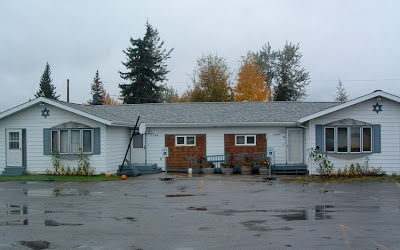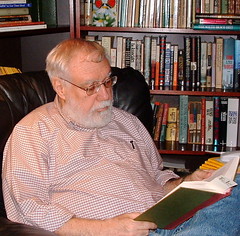Holy Days on the Last Frontier
 [The author is spending the current academic year teaching at the University of Alaska Fairbanks with his daughter, Hannah. The following appeared on his person blog.]
[The author is spending the current academic year teaching at the University of Alaska Fairbanks with his daughter, Hannah. The following appeared on his person blog.]The high holy days at what is believed to be mostly northerly synagogue building in the world, and one of the world’s northernmost Jewish communities, has begun. It is Judaism at the edge. That’s the synagogue above before anyone arrived.
Or Hatzafon (the Light of the North) sits on the northern edge of Fairbanks. A few blocks north is the frontier and there is nothing for 800 miles. There may well be Jews living further north than latitude 65, probably in Siberia, but no one knows of a synagogue building that high.
The congregation is about 80 families, almost all, like most Alaskans, from somewhere else. The president is from Delta Junction but he is a thoughtful convert. The woman running the Sunday school is from Massachusetts and several others I have met are from Long Island and Montgomery County, Maryland. Only the military are here by chance. One man told me he was from Delaware and has been here for 30 years. His first winter, the temperature dropped to 66 below and he absolutely had to go outside to experience it, and, no doubt, so he could tell the story 30 years later.
They have no permanent rabbi although they did buy a duplex home and convert it into a synagogue a few years ago. They also have a part time administrator, both of which put them ahead of the synagogue I belong to in Baltimore. They have begun a search for a rabbi. They get student rabbis for the summer and save their b’nai mitzvot for when one is around, and it would be interesting to see who they can get to come up here permanently.
For Rosh Hashanah they brought in a woman rabbi from San Diego. They are affiliated with the Reform movement in part because it gives them more flexibility to please more a diverse population. Congregants range in skills from one man with a lovely, if untrained, voice who acted as a knowledgeable cantor, to people who know very little. They use, at least for the moment, an old Conservative prayer book for shabbot with the Hebrew transliterations pasted on the pages. They have ordered the new Reform siddur. The machzor for the holidays is the New Machzor from Media Judaica, which lacks the excruciating translations of the Silverman, and is less traditional and has little explanatory text.
(The nearest Conservative synagogue is in Vancouver, in a whole other country. There is a Chabad House in Anchorage and two other Reform synagogues there and two small ones near Kenai. That’s it for Alaska’s Jews, all 5,000 of us in a zillion square miles.)
About 60 people came for Rosh Hashanah. The dozen or so children played in the kitchen area; the adults prayed in what was probably one half of the duplex converted into a sanctuary. Most were regular members, a few were people who apparently came in from the bush (which in part may explain the pickup trucks in the parking area), and there were a couple of visitors, including one young woman from Montclair, N.J., who is working for Americorps in Nenana. There is usually someone from the army base. They have two Torahs, including a small kids’ one, both in need of repair. The large one came from a defunct synagogue in the Ohio River valley. They are starting a repair fund.
The rabbi read the Torah; she didn't chant it. Haftorah is read in English for both holidays by the congregants. On Yom Kippur, the Torah was read by members in Hebrew, sometimes quite haltingly, sometimes skillfully. I had an aliyah and the reader was a young Israeli who danced through it. Most of the melodies were the ones I am used to and singing was enthusiastic, especially those prayers with transliterations in the book. One woman added both harmony and counterpoint to Adon Olom that was gorgeous. Indeed, it’s a good singing congregation. Yom Kippur was handled by the congregation and the house cantor, and done well.
The people are unique, delightfully odd and, like all Alaskans, notably friendly.
Hannah starts teaching in the Sunday school on the 30th, two courses, Hebrew and Judaics. I get some of my Schechter tuition back. Well, actually, no--she gets to keep it all.
Unlike communities back where most of you live, Alaska is oblivious to things Jewish. There are not enough of us to make an impact. School certainly doesn’t close down for the holidays, there being maybe a dozen Jewish students in the high school and no teachers I know of; the university schedules freely, there being maybe a dozen Jewish students (I haven’t met any yet--there is no Hillel). There is Jewish faculty, including the chair of English. When I told my students there would be no class last Thursday because of the holiday, several came up after class to ask questions. This was clearly all new to them. Often, the president has to call the Christian chaplains at the nearby army base to explain why a soldier has to be excused from duty because of the holidays. Jewish chaplains are rare in the current military and there hasn’t been one in Alaska for years. About four or five soldiers were at the service.
Keeping observant here is not an option for those less than rabid. Although the supermarkets keep the normal brands, many of which are kosher (including Hebrew National), unless you are willing to spend an inordinate amount of money to import food, you turn into a vegan whether you like it or not, and the stricter you are, the harder it would be. Lighting candles at this latitude is a major chore. Around the summer solstice you would have to stay up to nearly 3 a.m, and at the winter solstice, you light the candles right after lunch. Go any farther north of here, say 200 miles, and whole days go by without sunrise or sunset. (The synagogue here simply schedules candle lighting at 7:30 p.m. no matter what it’s doing outside.) Living within walking distance of a synagogue could be life-threatening when it’s 44 below zero, and you sure as hell aren’t going to wheel an infant in that weather--the kid would be solid by the time you arrived.
Tashlich was at the ice bridge (don’t ask--i’ll tell you later) on the Chena river. Our sins apparently float down the Chena to the Tanana and eventually, one hopes, to the great Yukon, where they no doubt merged with lots of other sins.
Yom Kippur had about 50 people and a pot-luck dairy break fast. All were reminded that poultry counts as meat and that the fish has to have fins. The (non-Jewish) owner of one of the better sea food restaurants in Fairbanks sent over some fish and salad--just to be nice.
You do the best with what you've got.


7 Comments:
At 1:20 AM, Anonymous said…
Anonymous said…
Sounds like you're coping as best as could be expected. Ooo, why does that sound like damning with faint praise? It's not, really, it's not!
At 10:13 AM, CW said…
CW said…
I hope that you and your family had easy fasts.
CW
At 8:41 PM, Joel Shurkin said…
Joel Shurkin said…
I didn't mean to damn with faint praise and I sure hope it didn't come across that way.
j
At 11:06 AM, Anonymous said…
Anonymous said…
Hi Yussel,
I have a question for you: I would love your honest opinion about how Alaska would fly for a nice Jewish girl from a big city who may be offered a job in the fine frontier state. I've read some of your blog, but I'd like your honest opinion: weather, lifestyle, Jew-less-ness...please break it down for an unemployed, somewhat adventurous, almost 40 gal.
At 11:39 PM, Zohara bat Sarah said…
Zohara bat Sarah said…
Shalom from down in Anchorage!
At 1:23 PM, Anonymous said…
Anonymous said…
Genial dispatch and this post helped me alot in my college assignement. Thank you as your information.
At 11:52 AM, Dan said…
Dan said…
They're trying to serve
Post a Comment
<< Home